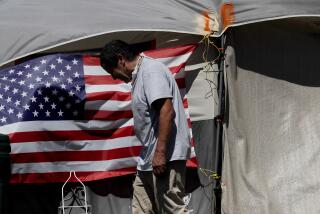Q&A: As Memorial Day approaches, U.S. eyes ongoing problems in the VA
As the nation heads into the Memorial Day weekend, ready to honor the men and women who died serving in its armed forces, the country is also trying to understand the latest series of problems rocking the Department of Veterans Affairs. Here are some questions and answers about the continuing scandal.
Are these the first complaints to hit the veterans health system?
The overwhelming majority of veterans praise the quality of healthcare they receive, but there have always been complaints about wait times at Veterans Affairs hospitals and clinics. In 2001, the General Accounting Office issued a report warning that wait times for medical services at VA clinics were excessive — and dangerous. Since then, wars in Afghanistan and Iraq have created a whole new generation of veterans needing physical and mental treatment, making the problems worse.
What put the issue in the spotlight again?
A doctor at a VA facility in Phoenix sent letters to the department’s inspector general in December complaining about delays in care. Whistleblowers in Arizona alleged that there was a secret waiting list to make it appear that veterans were getting their care within the targeted 14 days, but in reality the patients weren’t getting needed care.
There were also allegations that as many as 40 people may have died while on the lists, though no deaths have been tied to the delays. “We didn’t conclude, so far, that the delay caused the death,” VA Inspector General Richard Griffin said at a Senate hearing. “It’s one thing to be on a waiting list, it’s another for that to be the cause of death.”
Meanwhile, Rob Nabors, a top Obama administration official, was in Phoenix on Thursday as part of the ongoing investigation.
How did the scandal spread?
The complaints in Arizona prompted officials and former medical personnel from other hospitals to come forward to complain about long waiting times, poor healthcare delivery and an overly bureaucratized culture that was resistant to needed change. As of this week, the inspector general’s office said 26 facilities around the nation were being examined.
Is there a political component?
Yes. First there are the constituent groups such as the American Legion that represent veterans, which have called for the current head of the VA, former Gen. Eric K. Shinseki, to step down.
What about the political parties and the split in Congress?
Both Democrats and Republicans are upset at the delays and the possibility that there may have been deaths as a result. The obligation to take care of returning warriors is felt deeply in both parties and the nation. But some Republicans say the problems represent a failure of the Obama administration as the nation’s manager, and that the troubled veterans healthcare system proves the government’s inability to deal with such issues through Obamacare. The administration denies both sets of claims.
What happens next?
First, investigations at hospitals are continuing. Federal prosecutors are looking to see if any laws were broken in Phoenix and who may be responsible. Civilian investigations are also continuing and Robert Petzel, the VA’s top official for health affairs, resigned before he was slated to retire. Petzel testified that he knew health clinics were using inappropriate scheduling procedures as early as 2010.
Second, various legislation is pending in Congress to give top VA officials more control over the bureaucracy. The House has already passed a bill that would give the VA secretary more power to discipline the 450 career employees who serve as hospital directors or executives in the agency’s 21 regions.
Third, the rhetoric on all sides will certainly increase, as will the number of heads likely to roll.
“So if these allegations prove to be true, it is dishonorable, it is disgraceful, and I will not tolerate it, period,” President Obama told reporters this week after meeting with Shinseki. “Once we know the facts, I assure you, if there is misconduct it will be punished.”
More to Read
Sign up for Essential California
The most important California stories and recommendations in your inbox every morning.
You may occasionally receive promotional content from the Los Angeles Times.











